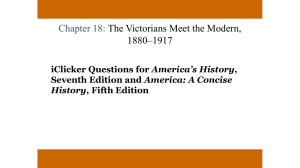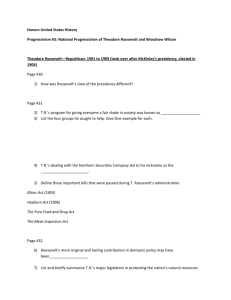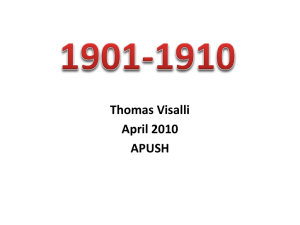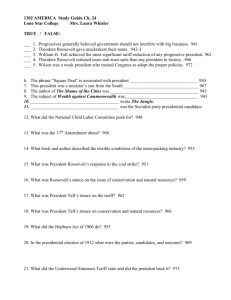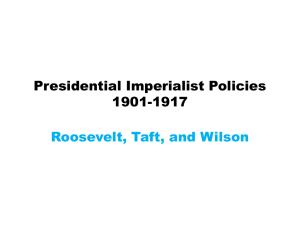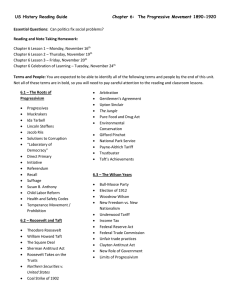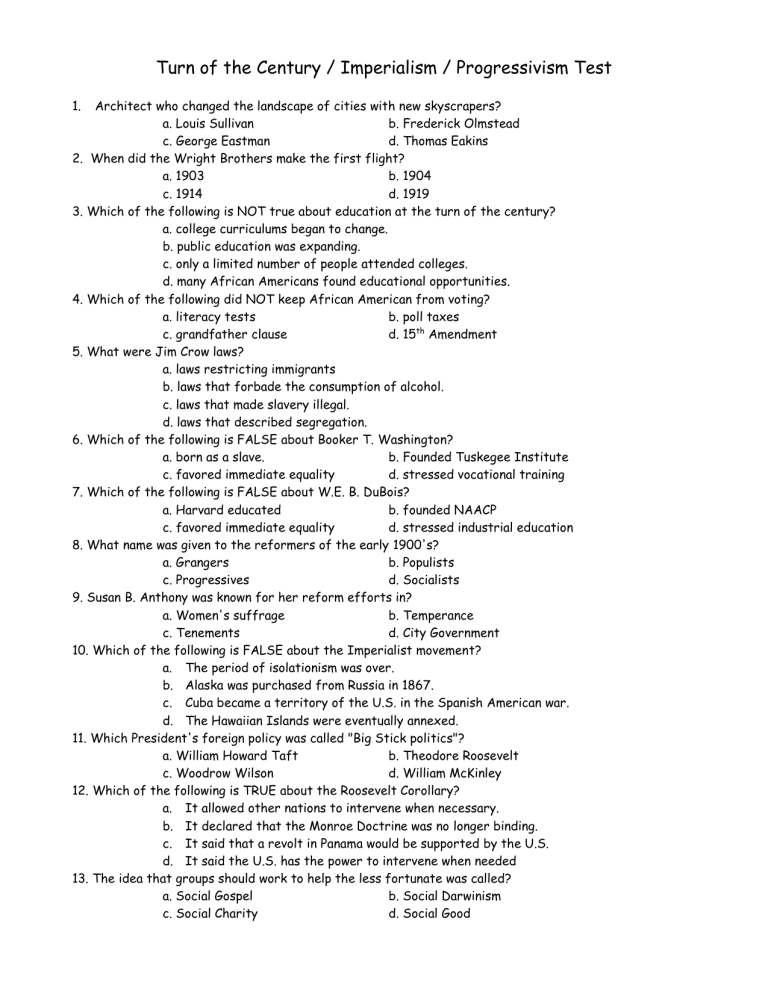
Turn of the Century / Imperialism / Progressivism Test 1. Architect who changed the landscape of cities with new skyscrapers? a. Louis Sullivan b. Frederick Olmstead c. George Eastman d. Thomas Eakins 2. When did the Wright Brothers make the first flight? a. 1903 b. 1904 c. 1914 d. 1919 3. Which of the following is NOT true about education at the turn of the century? a. college curriculums began to change. b. public education was expanding. c. only a limited number of people attended colleges. d. many African Americans found educational opportunities. 4. Which of the following did NOT keep African American from voting? a. literacy tests b. poll taxes c. grandfather clause d. 15th Amendment 5. What were Jim Crow laws? a. laws restricting immigrants b. laws that forbade the consumption of alcohol. c. laws that made slavery illegal. d. laws that described segregation. 6. Which of the following is FALSE about Booker T. Washington? a. born as a slave. b. Founded Tuskegee Institute c. favored immediate equality d. stressed vocational training 7. Which of the following is FALSE about W.E. B. DuBois? a. Harvard educated b. founded NAACP c. favored immediate equality d. stressed industrial education 8. What name was given to the reformers of the early 1900's? a. Grangers b. Populists c. Progressives d. Socialists 9. Susan B. Anthony was known for her reform efforts in? a. Women's suffrage b. Temperance c. Tenements d. City Government 10. Which of the following is FALSE about the Imperialist movement? a. The period of isolationism was over. b. Alaska was purchased from Russia in 1867. c. Cuba became a territory of the U.S. in the Spanish American war. d. The Hawaiian Islands were eventually annexed. 11. Which President's foreign policy was called "Big Stick politics"? a. William Howard Taft b. Theodore Roosevelt c. Woodrow Wilson d. William McKinley 12. Which of the following is TRUE about the Roosevelt Corollary? a. It allowed other nations to intervene when necessary. b. It declared that the Monroe Doctrine was no longer binding. c. It said that a revolt in Panama would be supported by the U.S. d. It said the U.S. has the power to intervene when needed 13. The idea that groups should work to help the less fortunate was called? a. Social Gospel b. Social Darwinism c. Social Charity d. Social Good 14. Which of the following was NOT a muckraker? a. Ida Tarbell b. Lincoln Steffins c. Upton Sinclair d. Walt Whitman 15. Which politician was able to implement primaries, initiatives, and referendums? a. Woodrow Wilson b. Robert La Follette c. Upton Sinclair d. J.P. Morgan 16. The government agency was the result of the book, "The Jungle"? a. Social Security b. Food and Drug Administration c. Center for Disease Control d. Housing and Urban Development 17. Which African American leader promoted higher education rather than occupational? a. Booker T. Washington b. George Washington Carver c. Frederick Douglas d. W.E.B. Du Bois 18. Which President was assassinated leaving Theodore Roosevelt President? a. Grover Cleveland b. William McKinley c. Woodrow Wilson d. William Jennings Bryan 19. Which Supreme Court case made segregation a fact of life in the nation? a. Plessy V.Ferguson b. Schenck v. U.S. c. Muller v. Oregon d. Brown v. Board of Education 20. Which President had the policy of the "Square Deal"? a. Woodrow Wilson b. Theodore Roosevelt c. William McKinley d. William Howard Taft 21. What issue did Wilson attack with the Underwood bill? a. banking system b. tariff c. agriculture d. trust 22. The Bull Moose party of Progressives was based on whose ideas? a. Taft b. Roosevelt c. Wilson d. McKinley 23. How did Wilson achieve his goal of stabilizing our currency? a. National Bank b. Federal Reserve c. Gold Standard d. Bi-metal Standard 24. Labor leaders would MOST likely agree with which of the following? a. laissez-faire b. Social Darwinism c. free enterprise d. Social Gospel 25. The Main goal of Booker T. Washington's Tuskeegee Institute was to provide blacks with training in which of the following? a. the sciences b. fine arts c. the military d. trade skills 26. The condition of the poor in the cities in the later part of the 1800’s a. generally improved due to advances in health and medicine. b. generally improved due to the work of charities and church organizations. c. tended to deteriorate due to over-regulation of industry. d. tended to deteriorate due to lack of industrial regulations. 27. In Plessy v. Ferguson, the Supreme Court held that a state could a. abolish segregation. b. prohibit a poll tax. c. require separate but equal facilities for blacks and whites. d. deprive blacks of their right to vote by adopting grandfather clauses. 28. Progressives believed that democracy and individual rights were threatened by the growth of a. labor unions b. big business c. the welfare state d. cities 29. Roosevelt’s Square Deal included a. deregulating all businesses. b. following laissez-faire economic policies. c. giving federal jobs to black Americans. d. trustbusting. 30. Who led the Rough Riders in capturing San Juan Hill? a. George Dewey b. Emilio Aguinaldo c. William McKinley d. Theodore Roosevelt 31. Which of the following did NOT become part of the United States after the Spanish War? a. Philippines b. Puerto Rico c. Guam d. Cuba 32. What did Muckrakers do to get their nickname? a. They worked for women’s suffrage. b. They helped to form labor unions c. They taught expanded curriculums in universities. d. They exposed social problems in our nation. 33. The Open Door notes referred to our trade relationship with what nation? a. Britain b. Philippines c. China d. Latin America 34. Theory that the only nation that will intervene in Latin America is called? a. Monroe Doctrine b. Truman Doctrine c. Bush Doctrine d. Roosevelt Corollary 35. The policy of staying out of the foreign affairs of other nations is called? a. Imperialism b. Interdependence c. Isolationism d. Inoculation 36. What suggestion did Alfred Mahan give the nation in his writings? a. warning to stay out of foreign entanglements. b. the benefits of a powerful navy. c. the advantages of a powerful executive branch. d. the benefits of building a canal. 37. What is significant about the phrase “Remember the Maine?” a. It reminded soldiers of the Alamo. b. It was meant to remind soldiers of their home state. c. It became a rallying cry for the invasion of Vietnam. d. It symbolized the reason for the war with Spain. 38. How did Panama represent Roosevelt’s Big Stick politics? a. He made Panama part of the United States. b. He invaded Panama to insure the canal was built. c. He helped to start a revolution in Panama. d. He refused to recognize independent Panama. 39. Who was the leader of the American Socialist Party in the early 1900’s? a. Eugene V. Debs b. Jimmy Hoffa c. William Howard Taft d. Theodore Roosevelt American True / False 40. The purchase of Hawaii from Japan was ridiculed as a waste of government money. 41. The explosion of the U.S.S. Maine in the Philippines led to war with Spain in 1898. 42. Roosevelt was one of the first President to show an interest in conservation efforts. 43. Roosevelt’s arbitration of the Russo-Japanese war won him a Nobel Peace Prize. 44. The Salvation Army and the YMCA are good examples of Social Darwinism. 45. Direct Primary elections allowed citizens a larger voice in choosing political candidates. 46. Sinclair’s book helped lead to the Supreme Court’s decision to limit women’s working hours. 47. Roosevelt’s New Nationalism promised many new reforms aimed to help the public. 48. Wilson’s view, of all trusts as being bad for society, was shared by many common people. 49. Wilson used the bully pulpit of the Presidency well by addressing Congress publicly. 50. The role of the FTC established under Wilson is to regulate the nation’s banking system.
